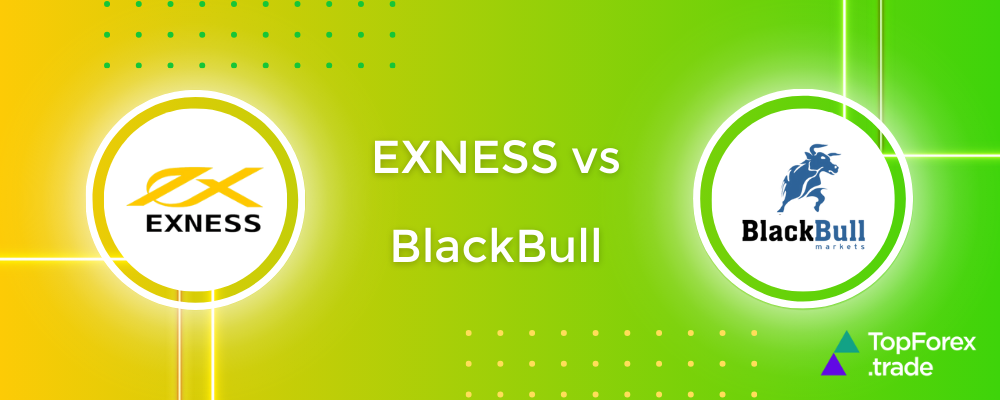Exness vs BlackBull: Which Forex broker should you choose? A comprehensive comparison

When choosing the right online brokerage for your trading needs, the variety of options can be overwhelming. Two prominent names in the industry, Exness, and BlackBull, have garnered significant attention due to their unique features, competitive fee structures, and robust trading platforms. This review will comprehensively compare Exness and BlackBull, focusing specifically on their fees, account types, different instruments, and trading platforms. By examining these crucial aspects, we aim to provide traders with the insights needed to make an informed decision, ensuring that their choice aligns with their trading strategies and financial goals.
NOTE: You can also find a concise video review of Exness ↓
Exness vs BlackBull: key features
| Exness vs BlackBull | Exness | BlackBull |
|---|---|---|
| Regulation | CySec, FCA, FSA, and the FSCA. | FMA (New Zealand), FSA (Seychelles). |
| Platforms | MT4, MT5, MetaTrader WebTerminal, Exness Terminal for Windows, Linux, macOS, iOS, or Android, Exness Trader App. | MT4, MT5, cTrader, TradingView, Webtrader, BlackBull Invest, BlackBull Mobile Trading App. |
| Accounts | Standard account, Standard Cent account, Raw Spread account, Zero account, Pro account, demo, Islamic account (Swap-Free) | ECN Standard, ECN Prime, ECN Institutional, Islamic account (Swap-Free), demo account. |
| Trading instruments | 120 trading instruments including 70 currency pairs, indices, stocks, metals, cryptocurrency, and commodities. | 26k+ tradable assets including 70 currency pairs, major market indices, stocks, precious metals like gold and silver, cryptocurrency, and commodities such as gas and oil. |
| Analytics and education | Analytical tools, economic calendar, trading calculator, market news by FXStreet, and more. | Webinars, workshops, educational videos and tutorials, written guides and articles, market analysis and research, and interactive learning materials. |
| Support | Live chat, email, phone. Customer support in 15 languages and 24/7 support in English, Chinese, and Thai. | 24/7 Support coverage. Email, live chat, phone. |
| Bonuses | — | Refer a friend bonus, and deposit bonus (available depending on country). |
| Minimum deposit |
$10 via cards.
|
US$0 to open a Standard account, $1 via bank transfer, Airtm, SEPPA. |
| Commissions | No management or withdrawal fees, lower trading costs with the right account type, and no swaps or overnight fees for most instruments. Raw Spread account has a commission of up to $3.50 on each side per lot | BlackBull’s transparent fees include trading spreads, ECN Prime and Institutional accounts commissions, and overnight swap fees. |
| Deposits and withdrawals | Bank card, Bitcoin, Skrill, Neteller, USD Coin, Tether (USDT ERC20), Wire transfer, Web Money. | Bank transfers, credit/debit cards, e-wallets, and Cryptocurrency deposits. |
| Social trading/copy trading | Social trading. | ZuluTrade, MyFxbook, and BlackBull Copy Trade System. |
| VPS | ✓ | ✓ |
Exness and BlackBull: summary
Exness and BlackBull are two distinct forex brokers catering to diverse trading needs. Exness boasts multiple top-tier regulations, offering a range of platforms and accounts with low fees. BlackBull, on the other hand, offers an extensive array of tradable assets, robust educational resources, and attractive bonuses. While Exness prioritizes security and affordability, BlackBull focuses on diversity and educational support. Traders should consider factors like regulation, trading instruments, fees, and support to choose the broker that aligns with their preferences and objectives. Additionally, traders can open accounts with both brokers to compare their features and services firsthand before making a final decision.
Exness and BlackBull: Top FX brokers
Exness
Exness stands out for its stringent regulation by CySec, FCA, FSA, and FSCA, ensuring a high level of trust and security for traders. It offers a diverse range of platforms and account types, accommodating various trading preferences. With low fees and comprehensive support in multiple languages, Exness provides an accessible and reliable trading environment for both novice and experienced traders. Traders looking for a regulated broker with competitive fees and versatile trading options will find Exness a suitable choice.
BlackBull
BlackBull distinguishes itself with a vast selection of over 26,000 tradable assets, including currency pairs, indices, stocks, metals, cryptocurrencies, and commodities. While its regulation by FSA Seychelles may offer some flexibility, the broker compensates with an extensive educational suite, attractive bonuses, and virtually no minimum deposit requirement. With a focus on diversity and educational support, BlackBull caters to traders seeking a wide range of trading opportunities and comprehensive learning resources.
Related articles:
Exness vs BlackBull - FAQ